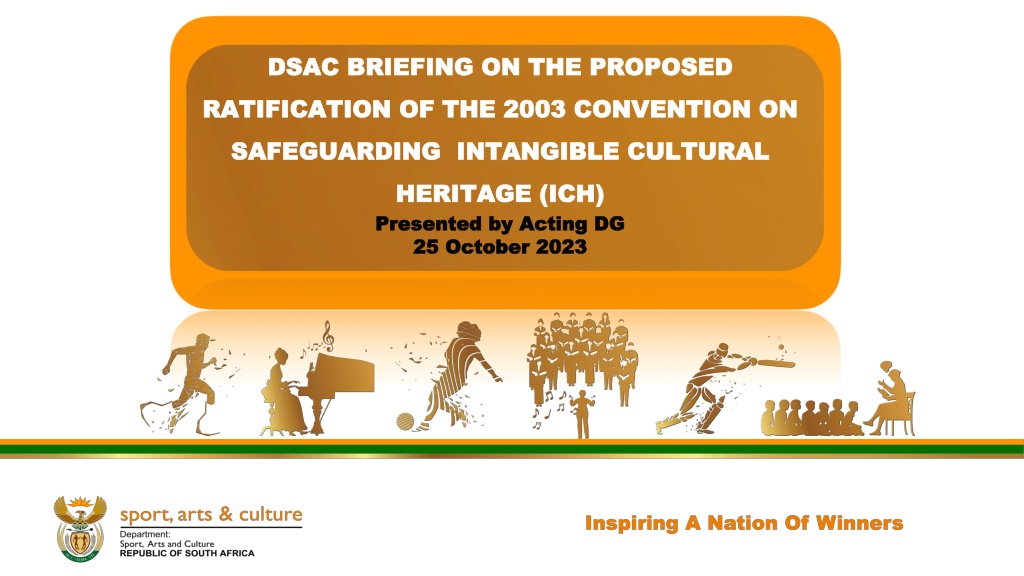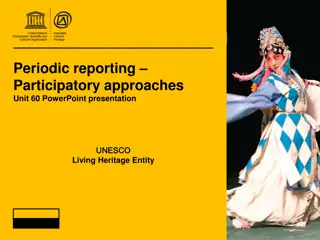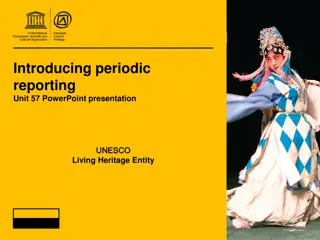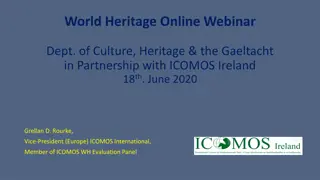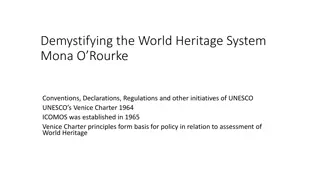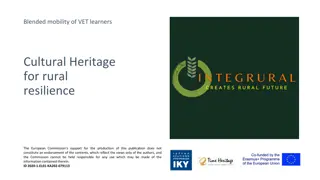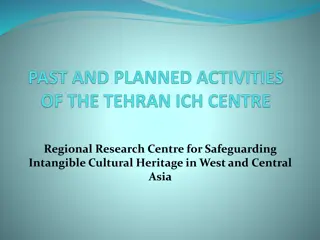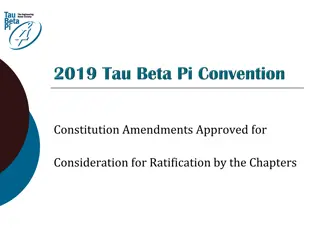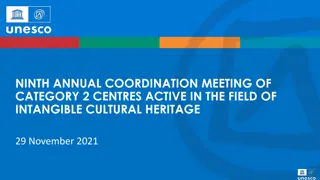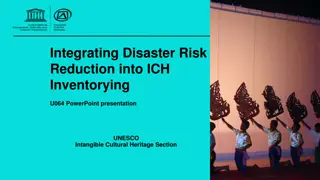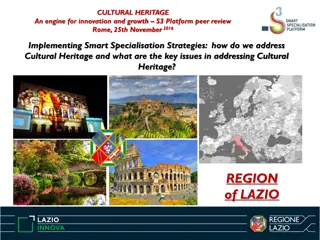Proposed Ratification of the 2003 Convention on Safeguarding Intangible Cultural Heritage
The briefing presents a proposal for the ratification of the 2003 UNESCO Convention on Safeguarding Intangible Cultural Heritage (ICH). The Convention aims to safeguard, preserve, and promote ICH, which includes practices, knowledge, skills, and cultural spaces passed down through generations. It emphasizes the importance of protecting aspects of ICH under threat and encourages international cooperation. The discussion highlights how managing South Africa's living heritage can promote social cohesion and contribute to nation-building, aligning with constitutional rights and development goals.
Download Presentation

Please find below an Image/Link to download the presentation.
The content on the website is provided AS IS for your information and personal use only. It may not be sold, licensed, or shared on other websites without obtaining consent from the author. Download presentation by click this link. If you encounter any issues during the download, it is possible that the publisher has removed the file from their server.
E N D
Presentation Transcript
DSAC BRIEFING ON THE PROPOSED DSAC BRIEFING ON THE PROPOSED RATIFICATION OF THE 2003 CONVENTION ON RATIFICATION OF THE 2003 CONVENTION ON SAFEGUARDING INTANGIBLE CULTURAL SAFEGUARDING INTANGIBLE CULTURAL HERITAGE (ICH) HERITAGE (ICH) Presented by Acting DG Presented by Acting DG 25 October 2023 25 October 2023
TABLE OF CONTENTS 1. PURPOSE OF THE PRESENTATION 2. SUMMARY 3. DISCUSSION 4. IMPLEMENTATION PLAN 5. FINANCIAL IMPLICATIONS 6. RISK MITIGATION 7. IMPLICATIONS FOR VULNERABLE GROUPS 8. DEPARTMENTS AND PARTIES CONSULTED, RESPONSES AND COMMENTS 9. CURRENT STATUS 10. RECOMMENDATION 2
1. PURPOSE OF THE PRESENTATION To present to the Select Committee on Education and Technology, Sport, Arts and Culture a proposal shared with Parliament for the ratification of the 2003 UNESCO Convention on Safeguarding Intangible Cultural Heritage (ICH). 3
2. SUMMARY The Convention provides for the safeguarding, preservation and promotion of ICH. ICH refers to practices, representations, expressions, knowledge, skills as well as instruments, objects, artefacts and cultural spaces associated with communities, groups and individuals and recognized as part of their cultural heritage. ICH is transmitted from generation to generation, it is constantly recreated by communities and groups in response to their environment, their interaction with nature and their history, and it provides them with a sense of identity and continuity. 4
2. SUMMARY CONT. Part of the reason for the safeguarding of ICH is the realization that a significant aspect of it is under threat of deterioration, disappearance and extinction. Among other measures, the convention obliges state parties to identify, define and devise appropriate measures for its preservation. It also encourages countries to adopt legal, technical, administrative and financial measures to safeguard and promote ICH. The convention promotes regional, continental and international cooperation Key features of the convention are that state parties must keep an updated representative list of ICH of humanity, and where applicable, a list of Intangible Cultural Heritage in need of urgent safeguarding. 5
3. DISCUSSION Strategic and effective management of South Africa s living heritage has a potential to promote social cohesion and nation building, thereby contributing to Outcome 14. The Bill of Rights provides rights to cultural, religious and linguistic communities to enjoy their cultural practices. It also affirms that government is committed to the cultural, social and economic upliftment and well-being of all people without discrimination. Chapter 15 of the National Development Plan indicates that arts and cultural activities can play a major role in healing and restoring pride among South African communities. The White Paper on Arts, Culture and Heritage emphasizes the importance of heritage in redressing historical inequalities, poverty eradication, employment growth and sustainable development. 6
3. DISCUSSION CONT. Intangible Cultural Heritage has potential to contribute to social cohesion and nation building on the social front and stimulating tourism development, creating job opportunities and enhancing investment climate, on the economic front. Some aspects of ICH, whether one talks of performances, rituals and rites of passage, to name but a few, take place in a communal context. A lot of collaboration and cooperation is essential. In most instances, bonds and networks are forged. Later, these bonds and networks contribute to social capital and become an important reference point for individuals and groups. The 2003 UNESCO Convention is explicit that its implementation should take place in the context of participation by communities, groups and non-governmental organizations. 7
3. DISCUSSION CONT. Some of the advantages that will accrue to South Africa on ratification to the Convention is that the country will be party to the sharing of international expertise and best practice. It will also intensify regional cooperation and integration on cultural matters. South Africa shares borders with 6 countries namely, Botswana, Eswatini, Lesotho, Mozambique, Namibia, and Zimbabwe. South Africa also shares a lot of culture and heritage with these countries, whether one talks about languages, music, dance and other cultural forms. The Convention provides for countries to develop joint lists, such as representative lists of ICH of humanity, lists of ICH in need of urgent safeguarding, as well as bilateral cooperation between countries. The Department of Sport, Arts and Culture will use this Convention to intensify regional and continental integration on arts, culture and heritage. 8
3. DISCUSSION CONT. Generally, globalization presents unique challenges to ICH; in most instances it increases its marginalization. Some cultural forms such as storytelling, some skills, techniques and performances are on the verge of extinction. The Convention prescribes certain measures for their safeguarding, such as the requirements for national government to identify and define ICH within its territory. It also requires state parties to develop national inventories, as well as national policies. 9
4. IMPLEMENTATION PLAN Implementation of the convention will require close collaboration with other national departments that do work pertaining to ICH, for example the Department of Science and Technology developed a national policy on Indigenous Knowledge Systems (IKS), the Department of Cooperative Governance and Traditional Affairs developed a National Policy Framework on Traditional Governance, meanwhile the Department of Health developed a National Framework Policy on Traditional Medicines. The provincial and local spheres of government have also implemented regulations and by-laws to deal with aspects of ICH. There is a need for a dialogue and alignment of these initiatives. 10
5. FINANCIAL IMPLICATIONS YEAR 1 YEAR 2 YEAR 3 R5 990 000 R15 863 400 R51 718 364 The Department has developed a national policy on Living Heritage that supports the domestication of the Convention once it is ratified by South Africa. The above table present an indicative costing related to the implementation of the national policy over a three-year period. The costing exercise was done few years back and does not contain costs per unit. These are estimated costs to be incurred by the entire sector that deals with the safeguarding of intangible cultural heritage during implementation. The Department will use its existing financial resources from National Treasury, as well as current staff component, and the work is included in the mandates and APPs of its relevant public 11 entities.
5. FINANCIAL IMPLICATIONS Cont. Key cost drivers include research, an audit of intangible cultural heritage including ICH in danger of disappearing, an inventory of ICH and IKS, projects to document, publish and disseminate ICH and ICH such as the publication and promotion of books on the work of Living Human Treasures and the work of the national ICH authentication panel. As required by the policy, the Minister appointed a national ICH authentication panel of experts to advise, inform and guide the implementation of a coordinated approach on the audit, the inventory and ICH and IKS documentation and promotion projects to be implemented by the National Heritage Council, the South African Heritage Resources Agency To reduce costs and duplication the panel is also guiding partnerships with key partners such as the Department of Traditional Affairs, Science and Innovation, Basic and Higher Education, Tourism, Trade and Industry, Research Institutions, Business Arts South Africa, SABC, etc. 12
6. RISK MITIGATION Exploitation of indigenous knowledge systems of communities by companies for profit is a large risk. The Protection, Promotion, Development and Management of Indigenous Knowledge Act, 2019 (Act No. 6 of 2019) should mitigate against this. It was also raised by the Department of Forestry Fisheries and Environment DFFE) that there is inadequate participation of indigenous communities in policy discussions pertaining to the protection and promotion of the rights of indigenous communities as custodians of indigenous knowledge systems. To mitigate against this, the DFFE included representatives of indigenous communities on the National Bioprospecting Forum. 13
7. IMPLICATIONS FOR VULNERABLE GROUPS South Africa s ICH thrives in the rural areas, and largely practiced by previously marginalized groups. The ratification to the convention presents an opportunity for government to redress colonial and apartheid legacies of neglect and obliteration. Implementation of measures in the convention will constructively contribute to the deepening of cultural diversity, social cohesion and nation building in the country. 14
8. DEPARTMENTS AND PARTIES CONSULTED, RESPONSES AND COMMENTS Consultations were held with a range of stakeholders, including civil society, statutory institutions, other government departments and practitioners in the field of ICH. The first national consultative workshop, where over 200 representatives of the sector were unanimous that the department should proceed to accede to the convention. The workshop encouraged government to move faster in the safeguarding, preservation and promotion of ICH as most of it is under threat of disappearance and marginalization. Legal opinions of consistency with domestic and international law and obligations were obtained from the State Law Advisors of the Departments of Justice and Constitutional Development, Forestry, Fisheries and Environment, and the Department of International Relations and Cooperation. 15
9. CURRENT STATUS The ratification of the Convention has been approved by Cabinet. It has been submitted to the two houses of Parliament. It has been shared with the Portfolio on Sport, Arts and Culture and was adopted. It is today being shared with the Select Committee on Education and Technology, Sport, Arts and Culture. Then it will be discussed and hopefully approved by Parliament, after which it will be deposited with UNESCO. 16
10. RECOMMENDATION Request the Select Committee on Education and Technology, Sport, Arts and Culture to support the submission of this Convention to UNESCO for ratification. 17
